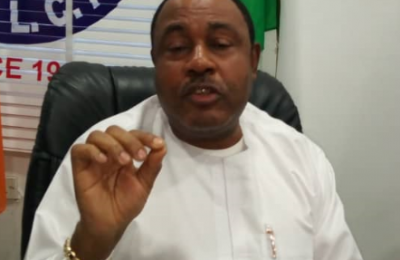…Wants involvement of youths of coastal communities
As the federal government through the Nigerian Maritime Administration and Safety Agency (NIMASA) gets ready for the deployment of advanced security assets to energise the blue economy, the Association of Nigerian Licensed Customs Agents (ANLCA) has said that a community supported security approach will be more productive.
The National President of ANLCA, Iju Tony Nwabunike who made the assertion while delivering a lecture titled, “Blue Economy: Pathway for Nigeria’s Economic Diversification”, at the 8th Annual Nigeria Transport Lecture organised by Transport Day Newspaper on Friday in Lagos, also called for a policy to involve the youths of coastal communities in an effort to support the Nigerian Navy and other security agencies in nipping the maritime insecurity in the bud.
Nwabunike had earlier on pointed out that Nigeria’s maritime domain suffered the setback of general insecurity either due to lack of priority attention, inadequate security platforms like patrol boats, aircrafts and supporting technology gadgets and lesser number of personnel to implement or enforce adherence to security on water.
He added that maritime piracy, sea robbery, oil theft, kidnapping on water or through water had been copiously recorded in the domain that should be contributing to the economic well-being of the nation.
According to him, “I am almost tempted to say that our Exclusive Economic Zone is no longer exclusive to us because the people I choose to call maritime bandits are threatening our space.
“I am aware that the Federal Government (through Nigerian Maritime Administration and Safety Agency) is rising to the occasion with planned deployment of advanced security assets to energise our blue economy. I believe it will work if consciously sustained. This they tagged the “Deep Blue Project.” It is anticipated that this move will go a long way in fighting piracy and other maritime crimes in the Gulf of Guinea and our country’s entire territorial waters.”
He went on to posit that safety of vessels, cargoes and crews on the Nigerian waters had direct impacts on the overall economy since the maritime sector was critical for Nigeria in the areas of trade, investment, employment and recreation.
“While government is procuring platforms and training personnel for maritime security, I wish to advocate that a community supported security approach will be more productive. Government should as a matter of policy involve youths of coastal communities in a kind of Civilian Task Force to support the Navy and other security agencies in nipping our maritime insecurity in the bud”, he further said.
He however argued that further development of the nation’s maritime potentials would be a bold step towards economic diversification for job creation, addressing insecurity and positioning the Nigerian ports for hub status in the West and Central African regions.
He maintained that “Everyone agrees that a safer and more secure maritime sector will open a vista of economic improvements for us a country.
“Most thriving businesses in our maritime domain are forced to spend a good part of their profits on the provision of security. Where such private arrangements are not made, oil, construction and other workers operating or transiting through our waters face risk of kidnap, robbery or murder. Of a truth, our maritime security profile and reputation is not impressive and should be urgently and practically worked upon.”
While noting that over 97 percent of ships lifting Nigerian crude oil to buyers in refining countries and vessels bringing refined petroleum products into the country were foreign owned, he insisted that those ships trading on Nigerian waters and carrying her number one foreign exchange products were manned mainly by foreign professionals and deckhands adding that Nigerian ship owners were struggling to break into this area of investment.
He revealed that notable numbers of Nigerians were involved as crew members onboard Liquefied Natural Gas and Liquefied Petroleum Gas (LPG) vessels under the Nigeria LNG Limited and its subsidiary, Nigeria LNG Ship Management Limited (NSML).
“I have to identify this because it’s worth replicating in other areas and made to spread across the industry where Nigerians will be first line beneficiaries of benefits derivable from our natural maritime endowments. The oil industry is truly not interfacing enough with the maritime sector to help in reversing this trend of inadequate participation of Nigerian investors and professionals in the lifting of crude oil and working as crew members onboard ships trading on our waters
“Over the years , I have followed the Nigeria Content Development and Monitoring Board (NCDMB) and posit that it is doing very well in expanding opportunities for Nigerians in the oil industry but has not synchronized with other agencies like NIMASA to promote our cabotage regime in maritime. Maritime transport is the key to unlock most of the untapped opportunities in the oil industry and will go a long way in supporting government’s effort at addressing insecurity in our coastal area”, he stressed.
Photo: ANLCA National President, Iju Tony Nwabunike.
Send your news, press releases/articles to augustinenwadinamuo@yahoo.com. Also, follow us on Twitter @ptreporters and on Facebook on facebook.com/primetimereporters or call the editor on 07030661526, 08053908817.

